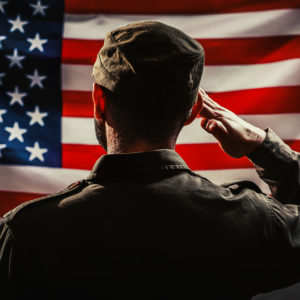The proximity of Memorial Day ensures that the U.S. military and veterans are top-of-mind for many Americans. This is especially true as the nation continues grappling with an impending pullout from Afghanistan, which represents 20 years of persistent conflict after the Sept. 11 terrorist attacks.
While many will recognize the brave service of post 9-11 veterans – as well as current and former service members – more must be done to address a dangerous and tragic problem: Too many of these individuals die by suicide. They are perilously disconnected from others and are not availing themselves of state or federal services. As a result, the U.S. still struggles with a troubling rise in suicides among active-duty military personnel and veterans, the latter of which outpaces the rate among the public.
In fact, after adjusting for sex and age, veteran suicide was 27.5 per 100,000 individuals in 2018, up from 25.8 per 100,000 in 2016. By comparison, among all U.S. adults, the suicide rate per 100,000 people was 18.3. To put things into perspective, more U.S. vets have died by suicide in the last 10 years than service members who died from combat in Vietnam.
At the same time, a total of 377 current service members died by suicide in 2020. That number is up from 348 last year. Active-duty suicides have been steadily increasing since 2016 when there were 280.
Stemming these preventable deaths requires a mix of public policy, mental health programs, and urgent support for traumatic brain injury research (TBI), particularly from veteran service organizations. As one small part of this, the group we lead is teaming up with other like-minded organizations to recognize the disconnection faced by these men and women is the doorway to tragedy that must be closed.
We are asking U.S. policymakers to declare a national day of recognition in which Americans work together to provide connection. We are proposing an annual National Warrior Call Day to take place this year on Nov. 21, 2021 – between Veteran’s Day and Thanksgiving – in which the sole mission is to find ways of connecting with those men and women and to steer them to resources and wellness before they despair.
The mechanics are simple and require only a phone.
All Americans – but especially active duty and retired military personnel – should take the day to make contact and call someone who has worn or is currently wearing the uniform, letting them know you care and connect them with support if needed. We have traveled to numerous military facilities, speaking with service members, speaking with veterans — and what we have found is that there is no better person to make that connection than a former battle buddy. But we all know service people and vets, as well as first responders facing many of the same issues, so it shouldn’t stop there.
Put simply, a phone call from someone to another could save a life.
Time is of the essence to make these connections and for Congress or the Biden administration to step up and help. Invisible wounds linked to an underlying and undiagnosed traumatic brain injury can mirror many mental health conditions. The traumas can affect and erode a person’s sense of hope, leading them to disconnect from teammates, family, and friends cause some to see suicide as the only way out. What they don’t realize is that suicide may end their pain, but the pain only transfers to the ones they love forever as those left behind carry a crippling sense of loss after losing their loved one.
Immediate action could take many forms, such as a resolution, executive action, standalone legislation, or language in an appropriations bill. Like one former president once said, we support the “all-of-the-above strategy,” as perfect need not be the enemy of good.
We hope our partners in government can choose an option and run with it. We’ll be there to help, making National Warrior Call Day a tool in the national arsenal of honoring and healing those who deserve it most.

